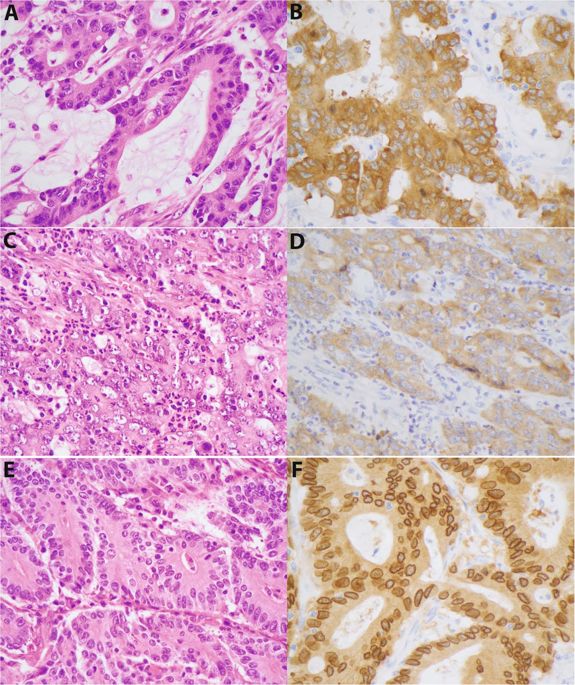当前位置:
X-MOL 学术
›
Modern Pathol.
›
论文详情
Our official English website, www.x-mol.net, welcomes your feedback! (Note: you will need to create a separate account there.)
NTRK gene rearrangements are highly enriched in MLH1/PMS2 deficient, BRAF wild-type colorectal carcinomas-a study of 4569 cases.
Modern Pathology ( IF 7.5 ) Pub Date : 2019-12-02 , DOI: 10.1038/s41379-019-0417-3 Angela Chou 1, 2, 3 , Tamara Fraser 1, 3, 4 , Mahsa Ahadi 1, 2, 3 , Talia Fuchs 1, 2, 3 , Loretta Sioson 1, 3 , Adele Clarkson 1, 3 , Amy Sheen 1, 3 , Nisha Singh 3 , Christopher L Corless 5 , Anthony J Gill 1, 2, 3
Modern Pathology ( IF 7.5 ) Pub Date : 2019-12-02 , DOI: 10.1038/s41379-019-0417-3 Angela Chou 1, 2, 3 , Tamara Fraser 1, 3, 4 , Mahsa Ahadi 1, 2, 3 , Talia Fuchs 1, 2, 3 , Loretta Sioson 1, 3 , Adele Clarkson 1, 3 , Amy Sheen 1, 3 , Nisha Singh 3 , Christopher L Corless 5 , Anthony J Gill 1, 2, 3
Affiliation

|
NTRK gene rearrangements are important to identify as predictors of response to targeted therapy in many malignancies. Only 0.16-0.3% of colorectal carcinomas (CRCs) harbor these fusions making universal screening difficult. We therefore investigated whether pan-Trk immunohistochemistry (IHC), mismatch repair deficiency (MMRd), and BRAFV600E mutation status could be used to triage molecular testing for NTRK gene rearrangements in CRC. CRCs from 4569 unselected patients underwent IHC in TMA format with two different anti-pan-Trk rabbit monoclonal antibodies. All positive cases were confirmed on whole sections and underwent RNA-sequencing. Pan-Trk IHC was positive in 0.2% of CRCs (9/4569). Both antibodies demonstrated similar staining characteristics with diffuse positive staining in all neoplastic cells. Of note 8/9 (89%) IHC positive cases were both MMRd (all showing MLH1/PMS2 loss) and lacked BRAFV600E mutation. That is, IHC was positive in 5.3% (8/152) MLH1/PMS2/BRAFV600E triple negative CRCs, but only 0.02% (1/4417) not showing this phenotype. All nine IHC positive CRCs demonstrated gene rearrangements (LMNA-NTRK1 in 5 CRCs, TPR-NTRK1, STRM-NTRK1, MUC2-NTRK2, and NTRK1 with an unknown partner in one each), suggesting close to 100% specificity for IHC in this sub-population. NTRK fusions were associated with right sided (p = 0.02), larger tumors (p = 0.029) with infiltrative growth (p = 0.021). As a part of universal Lynch syndrome screening many institutions routinely test all CRCs for MMRd, and then proceed to reflex BRAFV600E mutation testing in MLH1/PMS2 negative CRCs. We conclude that performing pan-Trk IHC on this preselected subgroup of MLH1/PMS2/BRAFV600E triple negative CRCs (only 3.3% of all CRC patients) is a resource effective approach to identify the overwhelming majority of CRC patients with NTRK gene fusions.
中文翻译:

NTRK 基因重排在 MLH1/PMS2 缺陷型 BRAF 野生型结直肠癌中高度富集——一项对 4569 例病例的研究。
NTRK 基因重排对于确定许多恶性肿瘤靶向治疗反应的预测因子很重要。只有 0.16-0.3% 的结直肠癌 (CRC) 具有这些融合,这使得普遍筛查变得困难。因此,我们研究了泛 Trk 免疫组织化学 (IHC)、错配修复缺陷 (MMRd) 和 BRAFV600E 突变状态是否可用于对 CRC 中 NTRK 基因重排的分子检测进行分类。来自 4569 名未经选择的患者的 CRC 使用两种不同的抗泛 Trk 兔单克隆抗体以 TMA 形式进行 IHC。所有阳性病例均在整个切片上得到确认,并进行了 RNA 测序。Pan-Trk IHC 在 0.2% 的 CRC 中呈阳性 (9/4569)。两种抗体都表现出相似的染色特征,在所有肿瘤细胞中均呈弥漫性阳性染色。值得注意的是,8/9 (89%) IHC 阳性病例均为 MMRd(均显示 MLH1/PMS2 缺失)且缺乏 BRAFV600E 突变。也就是说,IHC 在 5.3% (8/152) MLH1/PMS2/BRAFV600E 三阴性 CRC 中呈阳性,但只有 0.02% (1/4417) 未显示此表型。所有 9 个 IHC 阳性 CRC 均显示基因重排(5 个 CRC 中的 LMNA-NTRK1、TPR-NTRK1、STRM-NTRK1、MUC2-NTRK2 和 NTRK1 各有一个未知伴侣),表明该亚组中 IHC 的特异性接近 100% -人口。NTRK 融合与右侧 (p = 0.02)、较大的肿瘤 (p = 0.029) 和浸润性生长 (p = 0.021) 相关。作为通用林奇综合征筛查的一部分,许多机构常规检测所有 CRC 的 MMRd,然后在 MLH1/PMS2 阴性 CRC 中进行反射性 BRAFV600E 突变检测。
更新日期:2019-12-02
中文翻译:

NTRK 基因重排在 MLH1/PMS2 缺陷型 BRAF 野生型结直肠癌中高度富集——一项对 4569 例病例的研究。
NTRK 基因重排对于确定许多恶性肿瘤靶向治疗反应的预测因子很重要。只有 0.16-0.3% 的结直肠癌 (CRC) 具有这些融合,这使得普遍筛查变得困难。因此,我们研究了泛 Trk 免疫组织化学 (IHC)、错配修复缺陷 (MMRd) 和 BRAFV600E 突变状态是否可用于对 CRC 中 NTRK 基因重排的分子检测进行分类。来自 4569 名未经选择的患者的 CRC 使用两种不同的抗泛 Trk 兔单克隆抗体以 TMA 形式进行 IHC。所有阳性病例均在整个切片上得到确认,并进行了 RNA 测序。Pan-Trk IHC 在 0.2% 的 CRC 中呈阳性 (9/4569)。两种抗体都表现出相似的染色特征,在所有肿瘤细胞中均呈弥漫性阳性染色。值得注意的是,8/9 (89%) IHC 阳性病例均为 MMRd(均显示 MLH1/PMS2 缺失)且缺乏 BRAFV600E 突变。也就是说,IHC 在 5.3% (8/152) MLH1/PMS2/BRAFV600E 三阴性 CRC 中呈阳性,但只有 0.02% (1/4417) 未显示此表型。所有 9 个 IHC 阳性 CRC 均显示基因重排(5 个 CRC 中的 LMNA-NTRK1、TPR-NTRK1、STRM-NTRK1、MUC2-NTRK2 和 NTRK1 各有一个未知伴侣),表明该亚组中 IHC 的特异性接近 100% -人口。NTRK 融合与右侧 (p = 0.02)、较大的肿瘤 (p = 0.029) 和浸润性生长 (p = 0.021) 相关。作为通用林奇综合征筛查的一部分,许多机构常规检测所有 CRC 的 MMRd,然后在 MLH1/PMS2 阴性 CRC 中进行反射性 BRAFV600E 突变检测。



























 京公网安备 11010802027423号
京公网安备 11010802027423号